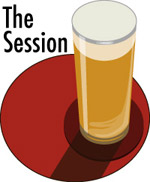 This month’s Session is hosted by Steve Lamond at Beer’s I’ve Known. The topic is “beery guilty secrets.”
This month’s Session is hosted by Steve Lamond at Beer’s I’ve Known. The topic is “beery guilty secrets.”
I am a man without a beer epiphany. At least one of the aha sort.
I don’t remember the what, when or where of my first beer. Or my first “better” beer. Or my first “craft” beer.
That’s my beer confession. I don’t feel guilty about this. Just a little embarrassed. It seems that since I’ve been around to report on much of what has happened within niche beer the last 20 years that I should recall that first xxxxxx beer in xxxxxx bar in xxxxxx city.
Instead I realize I come from a different time (before New Albion Brewing; or before CAMRA) and a different place (central Illinois). The beer options changed gradually. The quality of imported (mostly German) beer in the bottle was all over the map, but on draft it was definitely a step up from Stroh’s at $11.15 a case (inflation adjusted) and Michelob (on draft, which I only drank if somebody else was buying). And some year along the away I remembered that Sierra Nevada Celebration tasted pretty good last year and was back again.
That’s why, for me, the guilty pleasure will still be the next beer I drink.